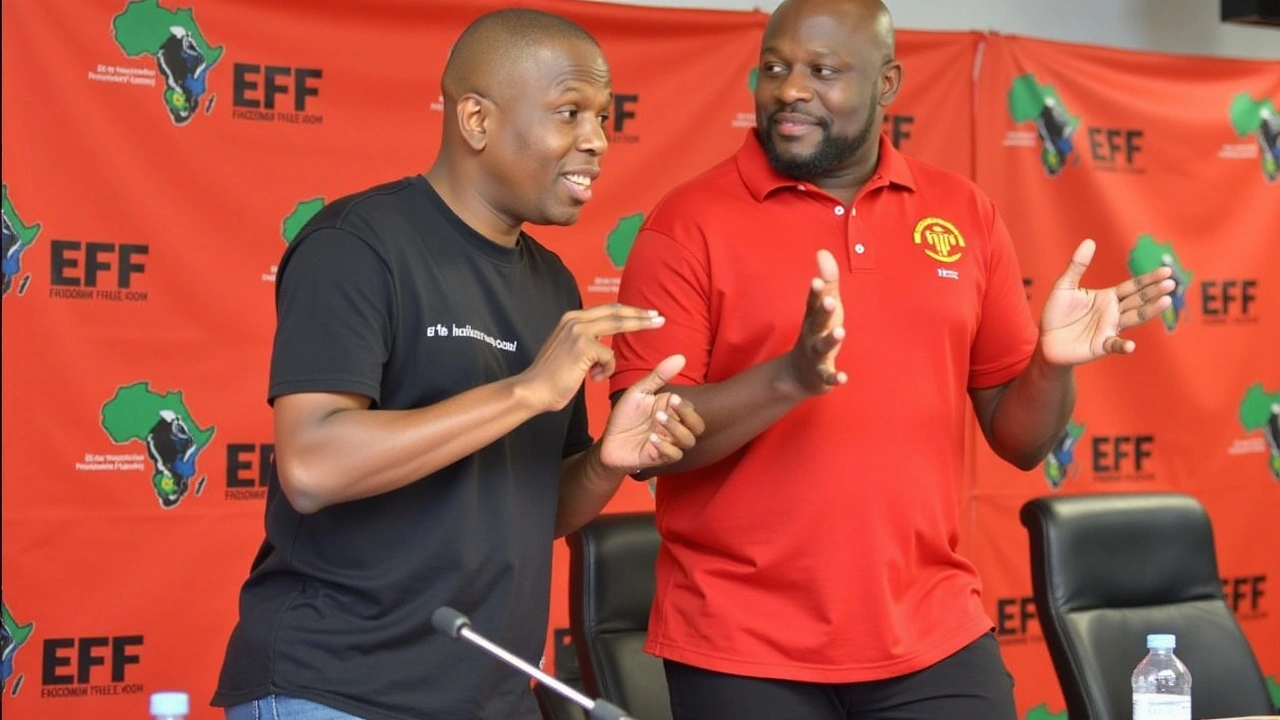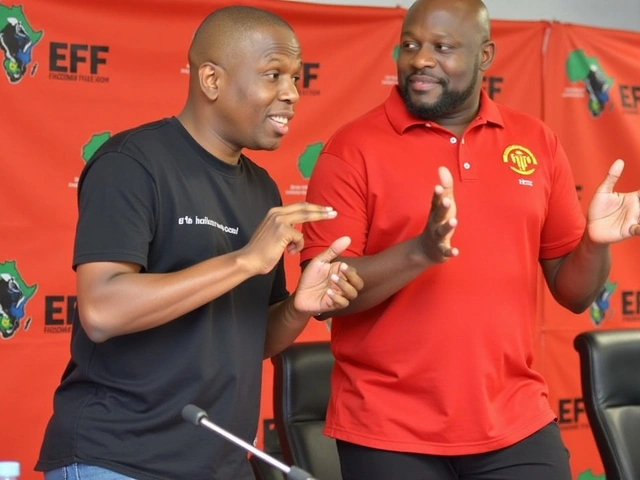
Floyd Shivambu's Departure: A Major Blow to EFF
In a startling turn of events, Floyd Shivambu, the deputy leader and co-founder of South Africa's opposition party Economic Freedom Fighters (EFF), announced his resignation during an urgent press briefing at the party's headquarters in Johannesburg. This announcement has sent shockwaves through the political landscape, particularly within the EFF, a party established in 2013 by Shivambu and Julius Malema after they were expelled from the African National Congress (ANC).
Shivambu has decided to join uMkhonto we Sizwe (MK), a left-wing political group led by former President Jacob Zuma. The timing of this move is especially critical, given that the MK party recently displaced the EFF as the third-largest party in the national parliament following the May elections. During these elections, the MK secured 15% of the votes, translating into 58 seats in parliament, while the EFF managed to garner 9% of the votes and 39 seats.
A Decade of Leadership
For over a decade, Shivambu has served as the EFF's deputy president, playing a pivotal role in shaping the party's policies and strategies. His leadership and the charisma he brought to the party have been instrumental in rallying support and mobilizing grassroots campaigns. His departure, therefore, is not just a loss of a competent leader but also a blow to the morale of the party's members and supporters.
Political analysts are already weighing in on the potential implications of this move. While some see it as a strategic miscalculation on Shivambu's part, others suggest that it could be a precursor to further defections. Julius Malema, co-founder and president of the EFF, has voiced concerns about a potential mass exodus from the party, warning that many other members might follow Shivambu's lead.
Impact on EFF's Future
The EFF has been preparing for its third elective conference, and Shivambu's resignation could not have come at a worse time. The party now faces the daunting task of filling the leadership vacuum left by his departure. Moreover, with the next general elections on the horizon, the EFF will need to re-strategize and strengthen its internal cohesion to avoid further destabilization.
The MK party, on its part, has warmly welcomed Shivambu and another resigning EFF member, Mzwanele Jimmy Manyi. Both have been promised positions that will utilize their strengths and areas of expertise. This move is seen as a strategic gain for the MK party, further solidifying its position as a significant player in South African politics.

Background and Implications
The EFF was born out of a sense of disenfranchisement within the ANC, particularly among its younger members. Shivambu and Malema, who were both expelled from the ANC, saw an opportunity to create a new political force that could address issues of economic inequality, land reform, and social justice. Over the past decade, the EFF has managed to carve out a niche for itself, appealing to a diverse constituency that includes young South Africans, marginalized communities, and those disillusioned with the ANC.
However, the party has also faced its share of controversies and internal conflicts. Shivambu's departure could be indicative of deeper issues within the party's structure and governance. As the EFF navigates this new landscape, it will be crucial for its leaders to address any underlying issues that could lead to further fragmentation.
Political Expert's Viewpoint
Political experts believe that Shivambu's move to the MK party is a significant shift in the South African political spectrum. The MK party, under Jacob Zuma's leadership, has been positioning itself as a viable alternative to both the ANC and the EFF. With its recent electoral success, the MK is poised to play a more substantial role in shaping the country's political future.
For the EFF, the challenge will be to maintain its identity and momentum in the face of this significant setback. The upcoming elective conference will be a critical moment for the party, as it will need to elect new leaders who can inspire confidence and unity among its members.

Looking Ahead
As South Africa's political landscape continues to evolve, the next few months will be crucial for both the EFF and the MK party. Shivambu's resignation is a reminder of the fluidity and unpredictability of politics. It underscores the importance of strong leadership, strategic planning, and the ability to adapt to changing circumstances. For Shivambu, this new chapter in the MK party represents an opportunity to leverage his experience and political acumen in a new setting. For the EFF, it is a wake-up call to address internal challenges and reinforce its commitment to its founding principles.
In conclusion, Floyd Shivambu's resignation marks a significant moment in South African politics. It highlights the dynamic nature of political alliances and the continuous reshaping of the political landscape. As the EFF and MK party move forward, their actions will undoubtedly have far-reaching implications for the future of South African democracy.






It is evident that the departure of a senior figure can precipitate a period of strategic recalibration within any political organization, and the EFF appears poised to confront such a juncture.
The party will need to reassess its leadership structure promptly.
From a structuralist perspective, Shivambu's exit constitutes a paradigmatic rupture that destabilizes the internal cohesion mechanisms ingrained within the EFF's organizational matrix. The ensuing power vacuum is not merely a superficial vacancy; it signifies a systemic erosion of the party's ideological continuity. Moreover, the transference of a high-profile deputy to a rival entity amplifies the perception of factional realignment, thereby catalyzing potential defections among the cadre. The MK's strategic acquisition of Shivambu's political capital is a calculated maneuver designed to augment its legislative leverage in Parliament. One must also consider the signaling effect such a move has on the electorate, where the narrative of opportunistic migration may undermine the EFF’s credibility. The internal dissent that likely precipitated this resignation hints at deeper governance deficits, including opaque decision‑making protocols and insufficient intra‑party accountability. Consequently, the party's grassroots mobilization capacity could experience a measurable attenuation, as local structures grapple with the loss of a central figurehead. Furthermore, the political discourse surrounding the resignation is being populated by a plethora of hyperbolic rhetoric, which obfuscates substantive policy analysis. In terms of electoral mathematics, the EFF's prior vote share may be susceptible to a downward trajectory if corrective measures are not instituted expeditiously. The role of media framing cannot be discounted; sensationalist coverage may exacerbate public disillusionment. Additionally, rival parties are likely to exploit this fissure, positioning themselves as more stable alternatives. The strategic imperative for the EFF, therefore, is to initiate an inclusive deliberative process that reconciles divergent factions and reasserts its foundational objectives. Failure to do so could precipitate a cascade of attrition, potentially reducing parliamentary representation below the critical threshold for influencing key legislative committees. Finally, the long‑term ramifications of this realignment will be contingent upon the efficacy of subsequent leadership appointments and the party's ability to restore internal morale. In sum, the EFF stands at a crossroads where adaptive resilience will determine its future relevance.
Shivambu’s move highlights the importance of a transparent succession plan; the EFF should draft clear guidelines to prevent leadership gaps.
While the shockwaves are palpable, this could also serve as a catalyst for renewed unity, prompting members to rally around shared values and chart a collaborative future.
It is incumbent upon the party’s executive committee to convene promptly, assess the strategic implications, and devise a cohesive roadmap that safeguards organizational stability.
Indeed, the scenario underscores a quintessential case study in intra‑party dynamics, wherein the redistribution of political capital necessitates a meticulous re‑evaluation of both tactical and doctrinal frameworks.
One might wryly observe that the EFF’s internal turbulence is almost theatrical in its timing, as if rehearsed for a dramatic climax that the audience never anticipated.
Honestly, it feels like some shadowy cabal pulled the strings, and now the party is left picking up the pieces in the dark.
Let’s stay focused and keep the momentum alive for the upcoming conference.
The void left behind will echo in the halls of power, a silent reminder of ambition’s fleeting nature.
Absolutely! 🎉 Your point about a clear succession plan is spot‑on!!! A transparent roadmap not only mitigates uncertainty but also reinforces confidence among the grassroots!!! 🌟
Oh sure, because political parties are exactly like well‑run corporations-always with flawless handovers. Yet, reality tends to be a tad messier.
Your analysis is riddled with hyperbole and over‑inflated jargon; a concise critique would serve the discussion better.
Looks like the EFF might need a fresh brew of ideas to spice things up.
Look, the drama is real but we should stick to facts and not let wild theories steer the conversation.
Hey folks, let’s channel this energy into constructive dialogue-after all, every crisis is just an opportunity in disguise!
That statement oversimplifies a complex situation.
Clearly this is a coordinated effort by external forces to undermine national sovereignty; the pattern is unmistakable!!!
What does this realignment reveal about the evolving nature of political allegiance in South Africa, and how might it reshape future ideological coalitions?